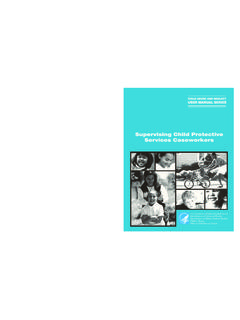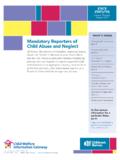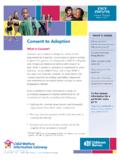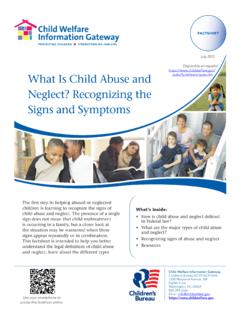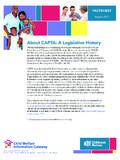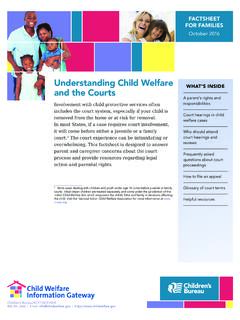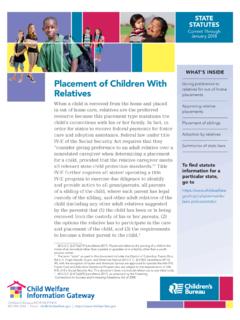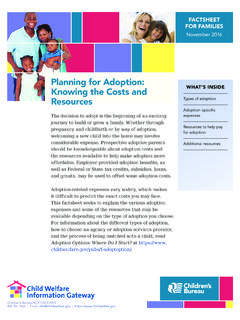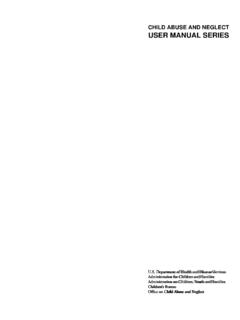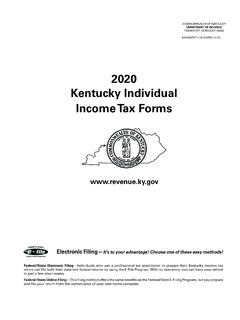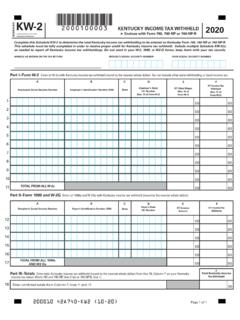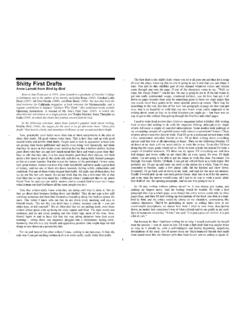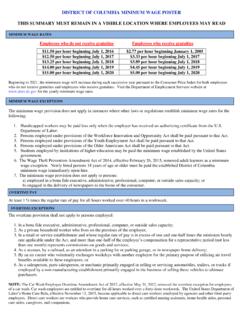Transcription of Court Hearings for the Permanent Placement of Children
1 Children s Bureau/ACYF/ | Email: | STATUTESC urrent Through January 2016 Court Hearings for the Permanent Placement of Children WHAT S INSIDES chedule of Court hearingsWho may be present at the hearingsDeterminations made at the hearingsPermanency optionsSummaries of State lawsTo find statute information for a particular State, go to Hearings are used to review the status and determine the Permanent Placement of Children who have been placed in out-of-home care, including foster care. The Adoption and Safe Families Act (ASFA) of 1997 ( 105-89) amended title IV-E of the Social Security Act in an effort to provide added safety and permanency for Children in out-of-home care.
2 ASFA placed an emphasis on improving planning and expediting decision-making for the Permanent Placement of Children in the child welfare TheogJatyuetn2Tt0Te1hgTgnt06hpT1 TgntuytC2o6seTgt2 This material may be freely reproduced and distributed. However, when doing so, please credit Child Welfare Information Gateway. This publication is available online at requires that the status of each child in out-of-home care be reviewed at least once every 6 months by either a Court or an administrative 42 675(5)(B) (2015).
3 In addition, under ASFA, a permanency planning hearing must, at a minimum, be held within 12 months of the date the child entered care and every 12 months thereafter to review and approve the permanency plan for the 42 675(5)(C) (2015). If a determination is made by the Court that reasonable efforts to reunite the child with a parent are not required, a permanency planning hearing must be held within 30 42 671(a)(15)(E) (2015). To learn more about reasonable efforts, see Child Welfare Information Gateway s Reasonable Efforts to Preserve or Reunify Families and Achieve Permanency for Children : This generally occurs because grounds exist for the filing of a petition to terminate parental See Child Welfare Information Gateway s Grounds for Involuntary Termination of Parental Rights.
4 Of Court HearingsAll States, the District of Columbia, American Samoa, Guam, the Northern Mariana Islands, Puerto Rico, and the Virgin Islands require case reviews for Children placed in out-of-home care. In most States, the first case review hearing must be held within 6 months with subsequent Hearings every 6 months until the child s case is closed by the Court . Some States, however, require more frequent Hearings . For example, Minnesota, New Hampshire, and Ohio require case review Hearings every 3 months. Mississippi requires an initial review hearing within 3 months after the child enters care and subsequent Hearings every 6 months.
5 Georgia requires that the initial review hearing be held within 75 days and then every 4 months thereafter. In Virginia, the first review hearing must be held within 60 days, and then every 4 months as long as the child remains in the Court s Hearings are required in the statutes of all States, the District of Columbia, and Puerto Rico. In most States, the first permanency hearing must be held within 12 months after the child enters out-of-home care with subsequent Hearings every 12 months thereafter until the child achieves permanency.
6 If at any time during the course of the case the Court finds that reasonable efforts to return the child home are not appropriate, a permanency hearing will be scheduled within 30 States, however, maintain different timelines for conducting permanency Hearings . In New York, Oklahoma, and Texas the first permanency hearing must be held within 6 months. In Connecticut, the first hearing must be held within 9 months, and in Virginia, the hearing must be held within 10 months. In Florida, if the child was placed in shelter care, the permanency hearing must be held within 6 months.
7 In Louisiana, if the child was removed from the home before the disposition hearing, the permanency hearing must occur within 9 months. Four States provide for a shorter timeframe for permanency Hearings for young In Arizona, a permanency hearing is required within 6 months if the child is age 3 or younger. In California, the hearing is required within 120 days for a child age 3 or younger. In Georgia, the hearing is required within 9 months if the child is younger than age 7. In Vermont, the hearing is required within 3 months if the child is younger than age 3 or within 6 months if the child is age 3 to May Be Present at the HearingsAll States statutes specify the persons who are entitled to receive notice of Hearings so that they may attend and offer testimony.
8 Approximately three States, the District of Columbia, American Samoa, the Northern Mariana Islands, and the Virgin Islands limit attendance to the A party is a person or other entity, such as an agency, that either initiates an action, such as a request for a hearing, or is asked to respond to a petition and whose interests will be addressed by the Court . Arkansas, Illinois, and Wyoming restrict attendance to the parties. The term approximately is used to stress the fact that the States frequently amend their laws.
9 This information is current through January 2016. In child welfare proceedings, the term parties generally includes the child, the parent or guardian of the child, and the agency or department having custody of the Current foster parents are given party status in TheogJatyuetn2Tt0Te1hgTgnt06hpT1 TgntuytC2o6seTgt3 This material may be freely reproduced and distributed. However, when doing so, please credit Child Welfare Information Gateway. This publication is available online at States also allow other persons who have an interest in the child s welfare, such as the foster parent, preadoptive parent, or relative currently providing care for the child, to attend Hearings .
10 Other persons who may be allowed to attend include: The child s grandparent or other relative who is not currently caring for the child88 Grandparents may attend in Alaska, Kansas, Minnesota, Mississippi, and Puerto Rico. Other relatives may attend in Arizona, Florida, Indiana, Kansas, Massachusetts, and Minnesota. Former foster parents99 Missouri, New York, and Guam. The child s guardian ad litem1010 In 20 States: Alaska, Arkansas, Delaware, Florida, Georgia, Idaho, Iowa, Maine, Michigan, Mississippi, Montana, Nebraska, New Mexico, North Carolina, Ohio, Tennessee, Texas, Utah, Virginia, and Wisconsin.
